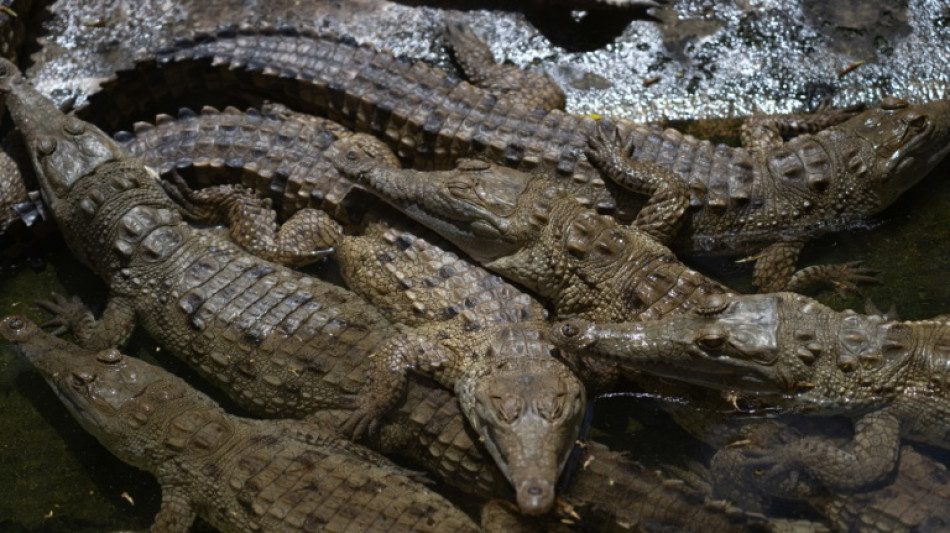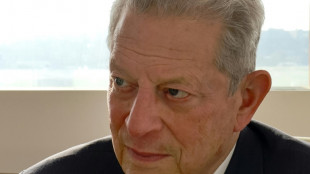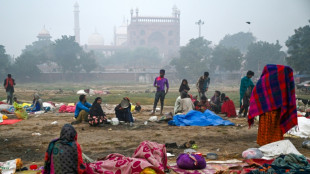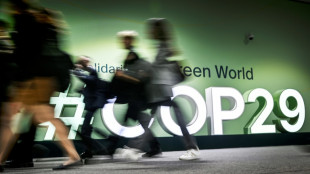
-
 Boeing strike will hurt Ethiopian Airlines growth: CEO
Boeing strike will hurt Ethiopian Airlines growth: CEO
-
Springboks skipper Kolisi wary of England's 'gifted' Smith

-
 End of a love affair: news media quit X over 'disinformation'
End of a love affair: news media quit X over 'disinformation'
-
US finalizes up to $6.6 bn funding for chip giant TSMC

-
 Scholz urges Ukraine talks in first call with Putin since 2022
Scholz urges Ukraine talks in first call with Putin since 2022
-
Zverev reaches ATP Finals last four, Alcaraz on brink of exit

-
 Lebanon rescuer picks up 'pieces' of father after Israel strike
Lebanon rescuer picks up 'pieces' of father after Israel strike
-
US retail sales lose steam in October after hurricanes

-
 Zverev reaches ATP Finals last four with set win against Alcaraz
Zverev reaches ATP Finals last four with set win against Alcaraz
-
Kerevi back for Australia against Wales, Suaalii on bench

-
 Spate of child poisoning deaths sparks S.Africa xenophobia
Spate of child poisoning deaths sparks S.Africa xenophobia
-
Comedian Conan O'Brien to host Oscars

-
 Rozner overtakes McIlroy and Hatton for Dubai lead
Rozner overtakes McIlroy and Hatton for Dubai lead
-
Mourners bid farewell to medic killed in east Ukraine

-
 Gore says 'absurd' to hold UN climate talks in petrostates
Gore says 'absurd' to hold UN climate talks in petrostates
-
Hamas says 'ready for ceasefire' as Israel presses Gaza campaign

-
 Amorim says Man Utd is 'where I'm supposed to be'
Amorim says Man Utd is 'where I'm supposed to be'
-
Japan hammer Indonesia to edge closer to World Cup spot

-
 Jeff Beck guitar collection to go under the hammer in January
Jeff Beck guitar collection to go under the hammer in January
-
Veteran Ranieri has 'no time for mistakes' on Roma return

-
 Van Nistelrooy says he will 'cherish' Man Utd memories in farewell message
Van Nistelrooy says he will 'cherish' Man Utd memories in farewell message
-
IAEA chief tours sensitive Iran nuclear plants

-
 Pompeii rejects 'mass tourism' with daily visitor limit
Pompeii rejects 'mass tourism' with daily visitor limit
-
Jailed Russian poet could be 'killed' in prison, warns wife

-
 French court orders release of Lebanese militant held since 1984
French court orders release of Lebanese militant held since 1984
-
Global stocks struggle after Fed signals slower rate cuts

-
 UK economy slows, hitting government growth plans
UK economy slows, hitting government growth plans
-
Primary schools empty as smog persists in Indian capital

-
 Palestinians turn to local soda in boycott of Israel-linked goods
Palestinians turn to local soda in boycott of Israel-linked goods
-
Typhoon Man-yi bears down on Philippines still reeling from Usagi

-
 UK growth slows in third quarter, dealing blow to Labour government
UK growth slows in third quarter, dealing blow to Labour government
-
Chris Wood hits quickfire double in NZ World Cup qualifying romp

-
 Markets struggle at end of tough week
Markets struggle at end of tough week
-
China tests building Moon base with lunar soil bricks

-
 Film's 'search for Palestine' takes centre stage at Cairo festival
Film's 'search for Palestine' takes centre stage at Cairo festival
-
Oil execs work COP29 as NGOs slam lobbyist presence

-
 Gore says climate progress 'won't slow much' because of Trump
Gore says climate progress 'won't slow much' because of Trump
-
'Megaquake' warning hits Japan's growth

-
 Stiff business: Berlin startup will freeze your corpse for monthly fee
Stiff business: Berlin startup will freeze your corpse for monthly fee
-
Wars, looming Trump reign set to dominate G20 summit

-
 Xi, Biden attend Asia-Pacific summit, prepare to meet
Xi, Biden attend Asia-Pacific summit, prepare to meet
-
Kyrgios to make competitive return at Brisbane next month after injuries

-
 Dominican Juan Luis Guerra triumphs at 25th annual Latin Grammys
Dominican Juan Luis Guerra triumphs at 25th annual Latin Grammys
-
Landslide win for Sri Lanka president's leftist coalition in snap polls

-
 Australian World Cup penalty hero Vine takes mental health break
Australian World Cup penalty hero Vine takes mental health break
-
As Philippines picks up from Usagi, a fresh storm bears down

-
 Tropical Storm Sara pounds Honduras with heavy rain
Tropical Storm Sara pounds Honduras with heavy rain
-
Pepi gives Pochettino win for USA in Jamaica

-
 'Hell to heaven' as China reignite World Cup hopes with late winner
'Hell to heaven' as China reignite World Cup hopes with late winner
-
Rebel attacks keep Indian-run Kashmir on the boil

| CMSC | 0.41% | 24.65 | $ | |
| BTI | 2.38% | 36.355 | $ | |
| BP | -0.28% | 28.97 | $ | |
| BCC | -0.38% | 139.815 | $ | |
| SCS | 0.38% | 13.32 | $ | |
| NGG | 0.35% | 62.59 | $ | |
| GSK | -1.83% | 33.3899 | $ | |
| BCE | -0.98% | 26.58 | $ | |
| RIO | 0.8% | 60.92 | $ | |
| CMSD | -0.07% | 24.34 | $ | |
| RBGPF | 2.67% | 61.84 | $ | |
| JRI | -0.3% | 13.0368 | $ | |
| RYCEF | 0.88% | 6.85 | $ | |
| RELX | -3.04% | 44.595 | $ | |
| VOD | 0.97% | 8.765 | $ | |
| AZN | -2.46% | 63.48 | $ |

Fighting to save Venezuela's Orinoco Crocodile
Venezuela's Orinoco Crocodile is a fearsome beast, but its enormous size and sharp teeth were no match for humans who hunted them to the brink of extinction.
Millions were slaughtered in the 20th century, mainly for their skins, and today, only about 100 adult females are left in Venezuela, according to the country's Fudeci natural sciences foundation.
Known to scientists as Crocodylus intermedius, the enormous reptile is native to the Orinoco basin that Venezuela shares with Colombia.
It can grow to more than six meters (19.7 feet) in length and over 400 kilograms (882 pounds), making it one of the largest crocodiles in the world.
According to the International Union for Conservation of Nature, it is critically endangered, having suffered an 80-percent population reduction in just three generations in the early and mid-1900s.
More than 2.5 million Orinoco Crocodile skins were exported from Venezuela from 1931 to 1934, according to official Venezuelan figures.
Today, such trade is prohibited but the threat persists: the crocs are killed for their eggs and meat, and sometimes out of fear. And their habitat is ever shrinking and defiled by pollution.
Efforts that started in 1990 to breed new crocs in captivity have seen some 10,000 freed back into the Venezuelan wild.
But their numbers have not significantly increased.
"We do a part... to raise the animals and then release them, but after that it no longer depends on us, there has to be protection of these animals, surveillance, control, there has to be environmental education," conservationist Federico Pantin told AFP.
Pantin, 56, manages the Leslie Pantin breeding zoo -- named after his father who founded it -- with his wife Tuenade Hernandez in the northern state of Aragua. It is one of several croc breeding centers in the country.
- 'Seeds of conservation' -
On Sunday, Pantin was on hand for the release of 160 hatchlings -- small and green-skinned with black spots and light eyes -- into the Capanaparo River.
The zoo's captive breeding pair produces about 40 eggs at a time.
The eggs are incubated for about 90 days in very specific conditions, buried in sand at a depth of 33 centimeters, at a temperature of between 30 and 34 degrees Celsius (86-93 degrees Fahrenheit) and humidity of 85-90 percent.
The crocodiles mostly hatch in May, and at about one year of age, they are freed.
Zoo staff also capture free-born baby crocs in the river to raise them in relative safety.
"Predation in the natural environment is very high" with birds, fish and other reptiles all feeding on the defenseless hatchlings, explained Pantin.
By raising them at the zoo, 95 percent of the hatchlings survive -- whereas most would have died in their natural environment.
"The animals arrive here about 24 centimeters (9.4 inches) long and weighing about 80 or 100 grams (2.8-3.5 ounces)... we release them when they reach about 80 or 90 centimeters and weigh four kilos," said Pantin.
According to Diego Bilbao, director of a company called Rio Verde which organizes tours to witness the annual release of young crocs, the sector holds potential for tourism income with a conservational side benefit.
If locals and Indigenous communities can be convinced to see the crocs as a source of income, he explained, "they help protect it."
The Pantin Zoo, which also works to conserve other threatened species such as the Red Siskin finch, the stubfoot toad and the wood turtle, also seeks to instill a natural stewardship mindset in visiting school groups.
"I love it," said Hernandez of this part of her job. "The seeds of conservation are sown at a young age."
S.Gregor--AMWN
